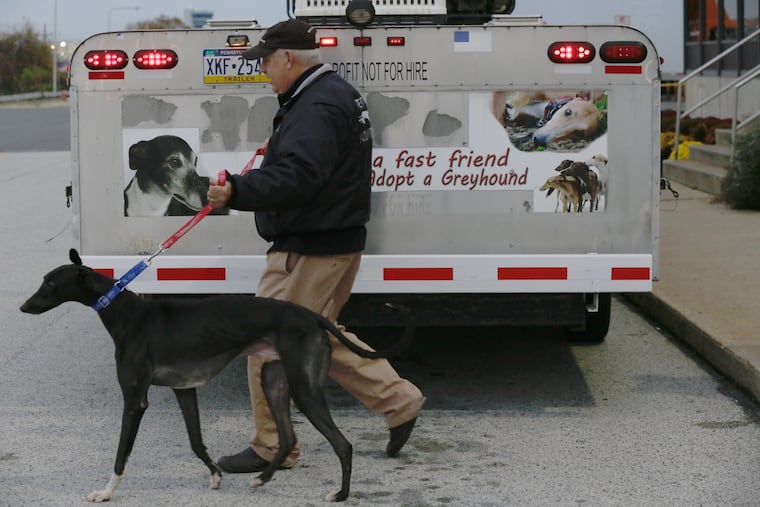Greyhounds arrive in Philly from the ‘worst racetrack in the world’
The National Greyhound Adoption Program in Philadelphia has pledged to take 100 dogs from a racetrack in China that reportedly euthanized 30 greyhounds per month.

Among those flying into Philadelphia during one of the busiest travel days of the year on Wednesday were five greyhounds from China.
It was a journey of more than 9,500 miles for the former racing dogs from the Canidrome in Macau, a brutal racetrack that reportedly euthanized 30 greyhounds per month. The track closed in July, leaving 650 greyhounds without homes.
The National Greyhound Adoption Program in Philadelphia pledged to take 100 dogs, including the five that exited a cargo plane on Wednesday. David Wolf, who leads the greyhound rescue group, said his facility has accepted 33 greyhounds from Macau and has committed to take more than any other organization in the world.
"The dogs have arrived in good condition," Wolf said this week. They are thin and have extreme dental-care needs, but that "can be put off until we put some weight on them and they're settled, and the stress of this hugely long trip has gone away," he said.
Animal rights activists called the Canidrome "the worst racetrack in the world," and a 2011 investigation by the South China Morning Post found that 383 under-performing dogs were killed there in 2010. The track closed this year after the Macau government told the operator to move the races out of the gambling mecca's downtown to make room for redevelopment, the New York Times reported.
To get to Philadelphia, the greyhounds traveled from Macau to Hong Kong, where they stayed overnight before boarding a flight to Frankfurt, Germany. Veterinarians greeted the greyhounds at Philadelphia International Airport to ensure they did not have serious medical issues. The National Greyhound Adoption Program transported the animals to its facility in Northeast Philadelphia in a stainless-steel dog hauler.
Wolf said his nonprofit facility is the "best in the nation" and can comfortably house 100 dogs in single stainless-steel cages that are raised above the ground. That way, when the animals relieve themselves, they don't have to lie in their mess. A veterinary clinic adjoins the facility. The greyhounds get regular exercise, Wolf said.
"I don't know of any one [facility] that has this combination of all this good stuff to make everything so good for the dogs that are here until we find homes for them," he said.
Those who want to adopt a greyhound can contact the National Greyhound Adoption Program through its website, www.ngap.org, or by calling 215-331-7918. Adoptions cost $280, which includes neutering or spaying for the dogs and any other medical attention they may have needed.
Wolf, a 79-year-old industrial landlord, started the National Greyhound Adoption Program in 1990 after a chance encounter during a Florida vacation sparked an obsession for greyhound rescue. While at a greyhound racetrack in Hollywood, Fla., Wolf met a man who raced greyhounds and bragged about disposing losing dogs at medical laboratories for $20 to cut losses.
Florida will no longer have greyhound racetracks after voters there overwhelmingly approved a constitutional amendment to phase out dog racing by 2021. That will end races at the state's 11 racetracks, leaving just six active U.S. racetracks in five states: Alabama, Arkansas, Iowa, Texas, and West Virginia.
There were 63 racetracks nationwide in the 1980s, said Jim Gartland, executive director of the National Greyhound Association (NGA), a racetrack industry group. The NGA registers roughly 8,000 greyhounds per year, down from around 30,000 per year a few decades ago, he said.
Greyhound racing has long been criticized for reports of animal abuse. A 1994 Daily News story detailed egregious examples including the discovery of 100 starving greyhounds in Florida in 1989 and 143 greyhound carcasses found in an Arizona citrus orchard in 1992.
Gartland said a lot of the criticism of the industry is exaggerated and that there are "bad apples in every industry."
"On the whole, this industry treats these animals better than most people treat their pets," he said.